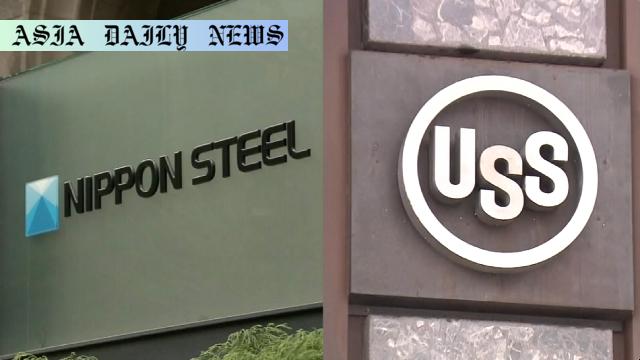Nippon Steel Plans Major US Steel Investment Amid Approval
Nippon Steel has proposed a $2.7 billion investment plan if the US government approves its US Steel acquisition bid.
The deal was previously blocked due to national security concerns; a fresh review is now underway with Trump’s decision expected by June 5.
Nippon Steel aims to address US concerns by pledging billions in job creation and facility upgrades.

Nippon Steel’s Vision for Expanding its Reach
Nippon Steel, one of Japan’s largest and most influential steelmakers, has set its sights firmly on expanding its global presence through the acquisition of US Steel. Reports reveal the company’s massive investment plans, which already include a pledged $2.7 billion to create jobs, revamp facilities, and modernize equipment. This ambitious move, contingent on approval by the US government, demonstrates Nippon Steel’s long-term commitment to fostering economic growth and industrial development in the United States.
The deal, however, carries more than just economic implications. Initially blocked by President Joe Biden in January on the grounds of national security, the plan faced significant hurdles. Yet, with the involvement of the Committee on Foreign Investment in the United States (CFIUS) and renewed scrutiny initiated by former President Donald Trump, the review process has reignited hopes for a favorable outcome. This represents a pivotal moment for Nippon Steel, which appears willing and ready to adapt its proposal to meet US standards and concerns.
Navigating National Security Concerns
A central issue in this unfolding saga is national security, which continues to be a major area of focus for US regulatory bodies. Steel manufacturing is considered a critical industry, and ensuring that US Steel remains compliant with national interests is non-negotiable. Nippon Steel, understanding the sensitivity surrounding its proposal, has reportedly increased its investment pledge, which now includes additional billions beyond the initial $2.7 billion.
These measures are not taken lightly. Nippon Steel is covering all bases—emphasizing job creation, infrastructure modernization, and transparency in its dealings. By aligning itself with broader US strategic interests, the company seeks to allay fears that foreign ownership might compromise economic or military stability.
Economic Contributions Beyond the Deal
One of Nippon Steel’s strongest arguments in favor of the acquisition lies in its potential to positively impact the US economy. The Japanese giant has not only pledged billions but also envisioned a strategy of long-term investments that go beyond immediate financial gains. This includes the creation of sustainable jobs, the deployment of cutting-edge technology, and training programs aimed at upskilling the American workforce. Such a comprehensive economic plan stands as a testament to Nippon Steel’s commitment to becoming a valued partner in US industrial growth.
Moreover, given the complexities of global trade and supply chains, the merger could pave the way for stronger bilateral relations between Japan and the United States. In a world increasingly defined by economic alliances, such partnerships hold the power to forge deeper ties and shared prosperity between nations.
Looking Ahead: Decision Timelines and Possible Outcomes
As the deadline for a final decision draws closer, all eyes are on Trump and the Committee on Foreign Investment in the United States. With the final assessment expected by June 5, Nippon Steel remains committed to adapting its proposal and addressing emerging concerns. The outcome of this negotiation will not only shape the future of US Steel but also serve as a case study in how foreign investments can align with national interests.
For Nippon Steel, a favorable nod could open new avenues of operation, allowing the company to directly contribute to the US economy and solidify its position as a global steel industry leader. On the other hand, should the deal be blocked, it might raise questions about the future of large-scale foreign investments in sensitive industries within the United States.



Commentary
A Pivotal Moment for Nippon Steel
Nippon Steel’s bid to acquire US Steel represents a defining opportunity for the Japanese company to expand its international footprint while also contributing directly to the US economy. There is no denying the boldness of Nippon Steel’s current strategy. Offering a multibillion-dollar investment plan not only highlights its financial clout but also suggests how seriously it views the prospect of establishing a dominant presence in North America.
The promise of job creation and the modernization of US Steel’s infrastructure signals goodwill and a forward-thinking strategy. Such efforts have the potential to transform US Steel into a more competitive entity on the global stage, benefiting not only the company but the local economies in which it operates. Nippon Steel’s effort to position itself as a partner rather than a foreign takeover force is crucial in navigating the complexities around national security and foreign direct investments into critical industries.
Challenges and Opportunities
However, this deal cannot be looked at through an entirely rosy lens. The concerns raised around national security are valid, particularly given the geopolitical importance of the steel industry in economic and military terms. Nippon Steel has a significant hurdle to cross in ensuring the US government and public that their interests are safeguarded. This likely explains the heightened focus on economic benefits and transparency in its negotiation approach.
Beyond the Business Deal
What stands out about this deal is its broader implications for international relations. Successful collaboration between Nippon Steel and US Steel could serve as a model for other foreign investments, showcasing how multinational deals can align with both economic and national interests. At a time when global alliances are continually being reshaped, fostering strong industrial partnerships between nations becomes more critical than ever.